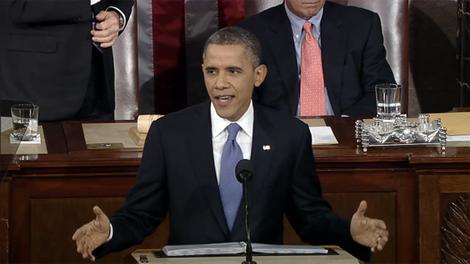Apple : Obama uses presidential clout to aid Apple in Samsung patent war |
| Obama uses presidential clout to aid Apple in Samsung patent war Posted:  US President Barack Obama has intervened to ensure some Apple devices will not be banned from arriving on home soil, following an International Trade Commission ruling in favour of Samsung. The ITC had recommended a US import ban on the iPhone 3GS, iPhone 4 and the 3G-capable iterations of the first-gen iPad and iPad 2 on the grounds that they violated a Samsung patent. However, Obama's administration has vetoed (or "disapproved") the decision, winning California-based Apple a reprieve in its long running legal battle with Samsung over mobile devices. The presidential order is significant because it is the first time the POTUS has intejected into a trade dispute since the 1987 Reagan administration. That occurrence also concerned tech companies, in a case filed by Texas Instruments, involving Sharp, NEC, Samsung and Toshiba. Undue leverageThe veto assures that Apple will be able to continue selling the accused devices, while newer, more relevant devices are unaffected due to newer chipsets that don't violate Samsung's IP. The decision, which was actually made by the Obama administrations US Trade Representative Michael who cited concerns that patent holders could obtain "undue leverage" by pursuing cases in this way. In a letter to ITC he wrote: "The Policy Statement expresses substantial concerns, which I strongly share, about the potential harms that can result from owners of standards essential patents ("SEPs") who have made a voluntary commitment to offer to license SEPs on terms that are fair, reasonable, and nondiscriminatory ("FRAND"), gaining undue leverage and engaging in "patent holdup", i.e., asserting the patent to exclude an implementer of the standard from a market to obtain a higher price for use of the patent than would have been possible before the standard was set, when alternative technologies could have been chosen." |
| Updated: Dept. of Justice has a plan to stop Apple from fixing ebook prices Posted:  Update: Apple wasted little time in responding to the Department of Justice's proposals: "[The] proposed injunction is a draconian and punitive intrusion into Apple's business, wildly out of proportion to any adjudicated wrongdoing or potential harm," the company's statement, picked up by AllThingsD, read. Apple called the proposed injunction "sweeping and unprecedented," a "tool to empower the government to regulate Apple's business" and potentially effect its business with its myriad of partners. Essentially Apple calls the DoJ's ideas far harsher than the crime, going on to propose its own "potentially valid injunction" that would include, among other proposals, "reasonable antitrust training obligations for Apple, lasting a reasonable term." "No further relief can be justified under the legal standard governing antitrust injunctions or the Constitution." Original article... Apple may be preparing to appeal its ebook price fixing defeat, but the DoJ has already devised its punishment. The DoJ proposed a plan today to stop Apple from repeating its alleged crimes in the future, reports CNET. Apple last month was found guilty of conspiring with publishers to increase the price of ebooks. The publishers previously settled out of court, but Apple went all the way to trial, a move that didn't pay off. The measures proposed today by the DoJ still need to go through the court, but if approved the orders should prove quite thorough. A modest proposalThe proposed plan is "intended to halt Apple's anticompetitive conduct, restore lost competition, and prevent a recurrence of the illegal activities," according to the DoJ. The plan is multifaceted. For starters, Apple would need to allow competing iOS apps like Amazon's and Barnes & Noble's to link directly to those companies' ebook stores so that customers can more easily compare prices. Apple would also need to end its agreements with Hachette, HarperCollins, Holtzbrinck/Macmillan, Penguin and Simon & Schuster, the five complicit publishers that settled rather than going to court. Apple wouldn't be allowed to enter into contracts that would fix its competitors prices in any way, funnel information between the conspiring publishers or retaliate against them, or - for five years - "[accept] limitations on its own ability to price-compete with respect to ebooks." Finally, Apple would be forced to pay for an external monitor to oversee the company's antitrust compliance policies and make sure everything's on the up-and-up. Again, the court still needs to approve these measures, and a hearing is scheduled on Aug. 9 for that exact purpose.
|
| You are subscribed to email updates from TechRadar: All latest Apple news feeds To stop receiving these emails, you may unsubscribe now. | Email delivery powered by Google |
| Google Inc., 20 West Kinzie, Chicago IL USA 60610 | |
No comments:
Post a Comment